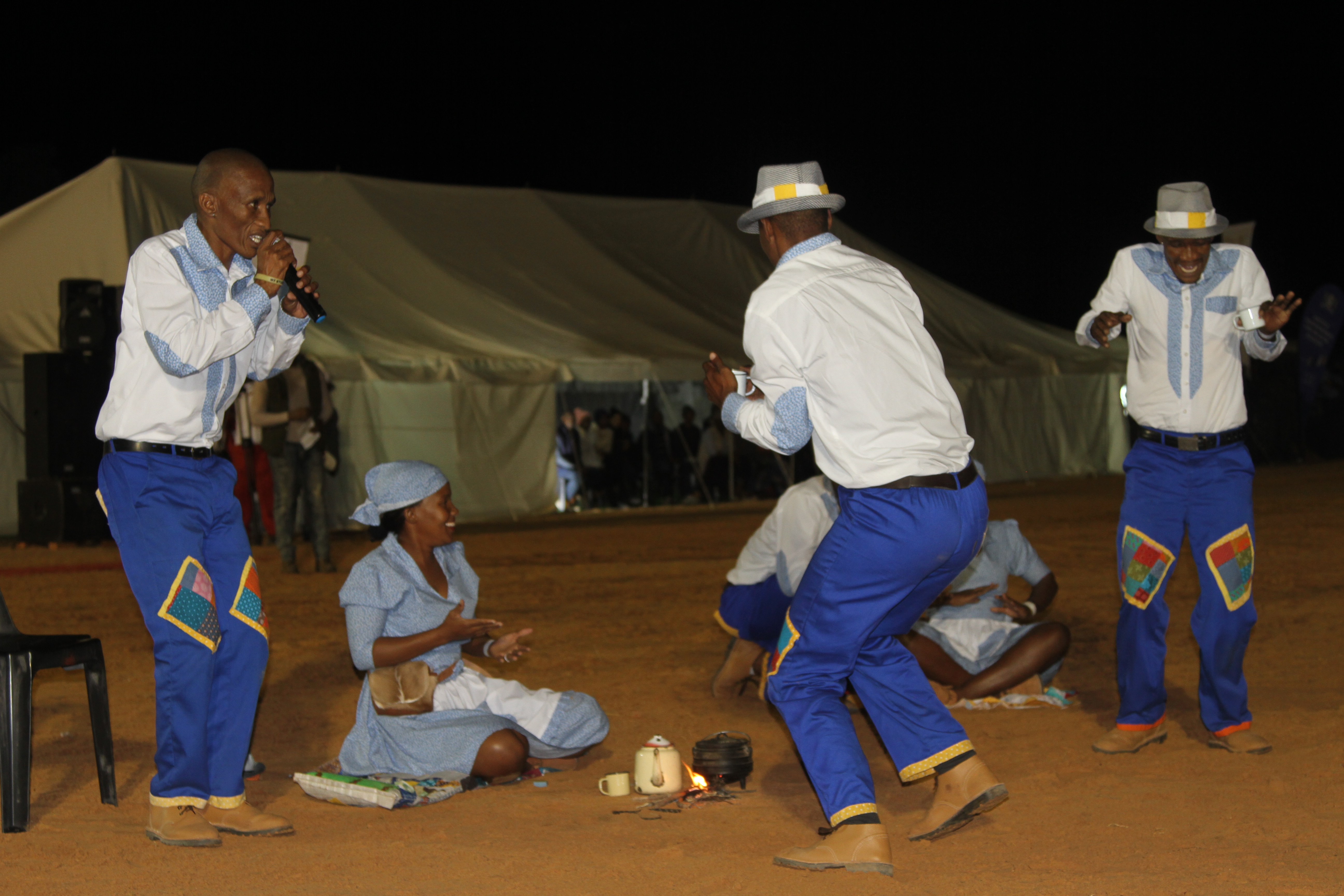- Nama Stap outperforms Polka
- Khawa performs 30 press-ups
ZOLANI KRAAI
Since 2013, the Khawa Dune Challenge and Cultural Festival has never failed to entertainment multitudes who throng the spectacular annual activity, particularly with its main cultural and contemporary music events.
Khawa fanatics have, since inception, found it advantageous to arrive earlier in the afternoon of the official opening day to witness the ever-captivating assemblage of entertainment by various traditional groups.
It is now a custom that the Kgalagadi District Polka dance favourites, Gareng Ga Dithota of Khawa, Geniet Met Ons Polka of Gakhibane and Kalahari Dance Polka of Struizendam dominate the festival.
But with the inclusion of other indigenous groups from within the same district, such as the Nama (Bakgothu), the event has proved to be a show in the path of promoting diversity in cultural tourism.
The Nama Stap dance groups are Khara Khoen and Hunikan from Lokgwabe and Tsabong villages respectively. The newly introduced troupe this year to the festival was Hunikan Nama Stap of Tsabong. It warmed up the unsociable cold evening, to the enjoyment of the spectators and dignitaries (VIPs) with their stimulating and colourful dance similar to polka.
The climax of Hunikan Nama Stap dance was related to spiritual and evening celebratory events under the moonlight dancing while drinking tea, that being a symbol of a new dawn of the hunting season.
The dance which has its origin from the Nama people of Namibia, some of whom are found at Lokgwabe and Tsabong West (Matlhatlaganyane ward) in Kgalagadi District is a revelatory art form, which has been around for centuries as a profound expression of the Nama people. The dance has now become a tool to preserve culture and unity amongst the Nama youth and to make the youngsters aware of their cultural background and roots.
Every time, especially towards the end of the Polka festival, former President Ian Khama would, to the loudest cheers of the spectators, make a surprise entrance into the open space, and this time around he didn’t dance a lot but went on to do 30 press ups (the Makwala challenge) during the Hunikan Nama Stap performance.
The Khawa Dune Challenge and Cultural festival is a product now prominent on the Botswana Tourism Organization (BTO) national calendar of events. It is not only held in a magnificent tourism landscape, but it is also one of Botswana’s economic and cultural diversification’s best practices, located in Kgalagadi South.
Co-organised by BTO, Ministry of Youth Empowerment, Sport and Culture Development (MYSC) and Botswana Motor Sport (BMS), Khawa has attracted approximately 3 700 spectators in 2014, 7 000 in 2015, 9 000 in 2016 and 15 000 spectators in 2017.
Local Economic Empowerment
One of the Khawa product objectives, is to stimulate the village and district diversification drive, through creation of small entrepreneurship opportunities. The product also seeks to enhance the spirit of self-reliance.
BTO and its district stakeholders such as the Kgalagadi District Council and the District Administrative office have over the years ensured that small micro enterprises opportunities are created for the locals during the event.
There is also provision for demarcated land in designated spaces earmarked for vendors (Bo-mmaseapei) to rent at minimal and affordable charges. Khawa Village Development Committee (VDC) therefore supervises the allocation of slots while at the same time it ensures that its guest house is in good order to accommodate guests.
The District Commissioner Rapetse Mathumo says the Khawa product has benefited the locals in many respects. He says the livelihood of the residents has changed taking into consideration the infrastructure development that included mostly houses for the elderly and underprivileged.
“Here we are talking of improving the economic status of the residents through housing and other socio-economic privileges donated by various stakeholders,” Mathumo shared.
Mathumo said despite lack of big businesses in the village, some locals have managed to set up some small tuck shops. He said this was due to the positive impact and successful outcome of the product over the years.
“The Khawa village extension teams have grown and are now able to run and sustain themselves in as far managing local projects are concerned, citing the existence of the Khawa Development Trust,” Mathumo shared.

